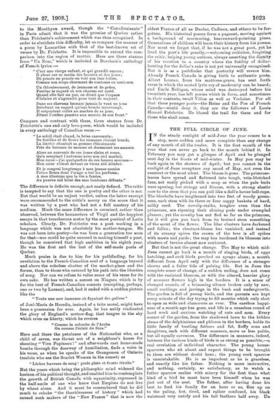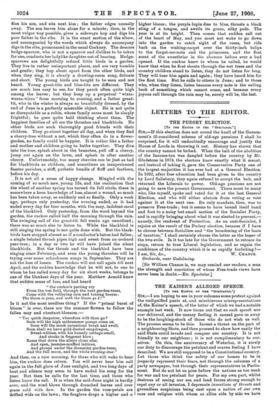THE FULL CIRCLE OF JUNE.
IN the steady sunlight of mid-June the year comes to a stop, more sudden and more complete than any change of any month of all the twelve. It is the first month of the year that can never go back to the month behind it. In February you may get a glimpse of April and be plunged next day in the frosts of mid-winter. In May you may be back again in the showers of April ; but you cannot in the sunlight of June recapture any mood of May, not even the sunniest or the most silent. The bloom is gone. The primrose. leaves have spread and flattened into tough, vein-blotched fans, not easily picked with a snap as when the pale buds were opening, but stringy and fibrous, with a strong elastic core to the stem that you can pull like a doll's-house bell-rope. The bluebells have lengthened into two feet of woody green- ness, each stem with its three or four sappy baskets of bard, milky seed. The cowslip-stalks, tougher even than the primroses, are ripening their shining pods under crumpled plumes ; yet the cowslip has not fled so far as the primrose, for it will give you back from its bruised stem something of the scent of the flower. The lilac clusters have darkened and fallen ; the chestnut-bloom has vanished, and instead of its creamy spires the crown of the tree is all spikes with masts and yards; the may has hardened its blossom into clusters of berries almost now sunburnt.
But that is not the great change. The May to which mid- June cannot go back is a month of singing birds, of eggs hatching, and cock birds perched on sprays alone ; a month different from April only with the difference of a stronger chorus and a fuller tide of pulsing life. But in June the complete sense of change, of a sudden ending, does not come with the vanished blossom, or with the altered, heavier glory of summer flowers high in the borders. It is a sense of changed sounds, of a brimming silence broken only by new, small rustlings and jarrings. in the bush and undergrowth. The garden is full of young birds, and the parents are kept every minute of the day trying to fill mouths which only shut to open as wide and clamorous as ever. The careless happi- ness of a month ago has gone, and life is a ceaseless round of hard work and anxious watching of cats and men. Every corner of the garden, from the shadowed lawn to the bidden stems of the delphiniums and phloxes in the borders, holds its little family of bustling fathers and fat, fluffy sons and daughters, each with different manners, more or less polite, but all equally ravenous. The difference in manners, indeed, between the various kinds of birds is as strong as possible,—a real revelation of individual character. The young house- sparrows who sit about and expect things to be brought to them are without doubt hens ; the young cock sparrow is unmistakable. He is as impudent as he is graceless, and exactly like his father. Nothing is more instructive, and nothing, certainly, so satisfactory, as to watch a father sparrow realise with misery for the first time what kind of a bird he must have been himself when be was just out of the nest. The father, after having done his best to feed his family for an hour or so, flies up on to the paling, hot, tired, and rather confused, hie black waistcoat very untidy and his tail feathers half awry. tie
flies his son, and sits next him ; the father edges uneasily away. The son leaves him alone for a minute; then, in the most vulgar way possible, gives a sideways hop and digs his poor father in the ribs. It is the exact motion of the elbow, and accompanied by the words which always do accompany digs in the ribs, pronounced in the usual Cockney. The demure hedge-sparrow, who is not a sparrow and dislikes to be taken for one, conducts her ladylike daughter out of bearing. Hedge- sparrows are delightfully refined little birds in a garden.
They live in rather unimportant places, and are very humble and gentle; they hop about apart from the other birds, and when they sing, it is clearly a drawing-room song, delicate and short. The young birds are taught to be seen and not
beard. Young great-tits and blue-tits are different. They are much leas easy to see, for they perch often quite high
among the leaves ; but they keep up a perpetual " wizza- vruzza-wizza " from morning to evening, and a father great- tit, who in the winter is always so beautifully dressed, by the end of June is a perfectly miserable object. He is not quite so disreputable as a robin, whose family cares must be simply frightful ; he goes quite bald thinking about them. The happiest families of all are the thrushes and blackbirds. No other birds are such thoroughly good friends with their children. They go about together all day, and when they find a cherry-tree without a net, which they often do in a floWer- garden,. no family could be happier. It is rather like a father
and mother and children going to bathe together. They dive into the tree, splash about in the branches, pull off a cherry,
jump_ out again on the lawn, and splash in after another cherry. Unfortunately, too many cherries can be just as bad for blackbirds as children, and sometimes an inexperienced feaster.perishes, a stiff, pathetic bundle of fluff and feathers, before his day.
..it is not all a sense of happy change. Mingled with the coming of so much new, young life, and the realisation that the wheel of another spring has turned its full circle, there is somewhere a keen knowledge of loss, almost a wound, so much has been taken away, so suddenly and so finally. Only a week ago, perhaps only yesterday, the evening ended, as it had
ended every day for four months, with the easy, indolent carol of the blackbird. Only yesterday, from the wood beyond the garden, the cuckoo called half the morning through the rain. The.swinging call of the great-tit fell weeks ago unnoticed ; there was so much else to listen to. While the blackbird is still singing the spring is not quite done with. But the black- birds have stopped almost as if a conductor's baton had fallen; a single belated thrush pipes high and sweet from an orchard pear-tree; in a day or two he will have joined the silent blackbirds.. But the thrush and the blackbird have been singing since February, and even the young thrushes will be trying over some schoolroom songs in September. They are not the loss of losses. The cuckoo will not call again till next April, and the sudden knowledge that he will not, to one to whom he has called every day for six short weeks, belongs to one of the blankest days of the year. Matthew Arnold knew that sudden sense of loss, and had beard " the cuckoo's parting cry From the wet field, through the vext garden-trees,
Come with the volleying rain and tossing.breeze : The bloom is gone, and with the bloom go I ! '
Is it not the most needless thing ? If the _" primal burst of bloom" is over, there are the summer flowers to follow the fallen may and chestnut-blossom :— " Too quick despairer, wherefore wilt thou go?
Soon will the high midsummer pomps come on, Soon will the musk carnations break and swell, Soon shall we have gold-dusted snapdragon, Sweet-william with his homely cottage-smell, And stocks in fragrant blow ; Roses that down the alleys shine afar, And open, jasmine-muffled lattices, And groups under the dreaming garden-trees, And the full moon, and the white evening-star."
And then, on a rare morning, for those who will wake to heir him, the cuckoo does return. You will never hear him call again in the full glare of June sunlight, and two long days of heat and...silence may seem to have ended his song for the
year". But then, he calls for the last 'time, and those who listen' know the call. It is when the mid-June night is hardly over, and the wind blows through drenched leaves and over
grass cold with dew. In the garden the rose-petals are drifted wide on the lawn; the foxglove drops a higher and a
higher bloom; the purple ,lupin dies to blue, thrusts a black sting of a. tongue, and swells its green, silky pods. The year is at its height. Then comes that sudden call out of the heart of May, and you must not wake to go down into the garden to catch sight of the roses, but ride back on the wishing-carpet over the thirty-inch tulips to the forget-me-note and the primroses, and the first scent of the sweetbriar in the showers before ever a bud opened. If the cuckoo knew to whom he called, he would know that when he first shouts through the wet trees and the country children stand to listen,. they do not listen for long. They will hear him again and again ; they have heard him for the first time. But he calls to others in June; and to those who, when they listen, listen because every note is the calling back of something which cannot come, and because every joyous call through the rain may be, surely will be, the last.























































 Previous page
Previous page